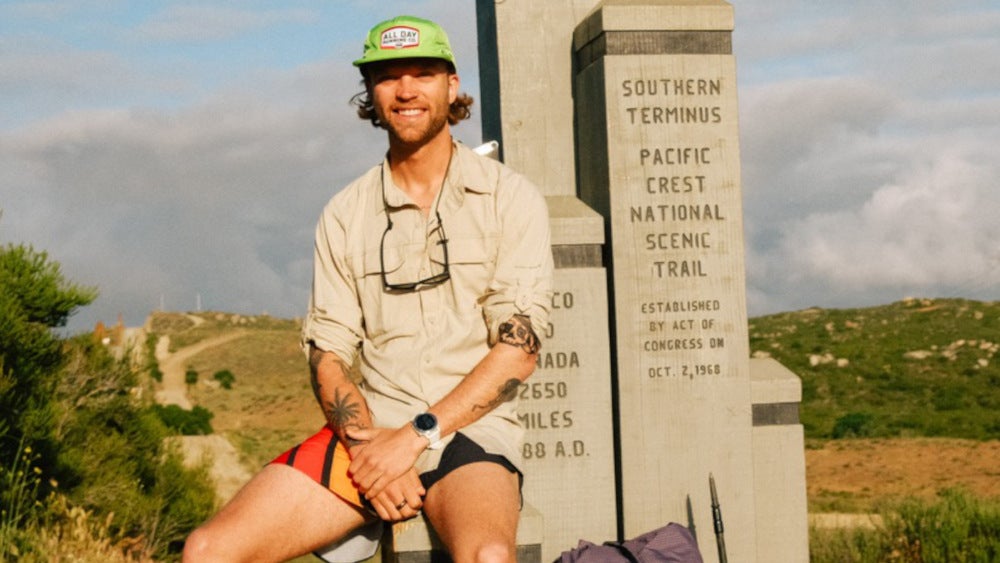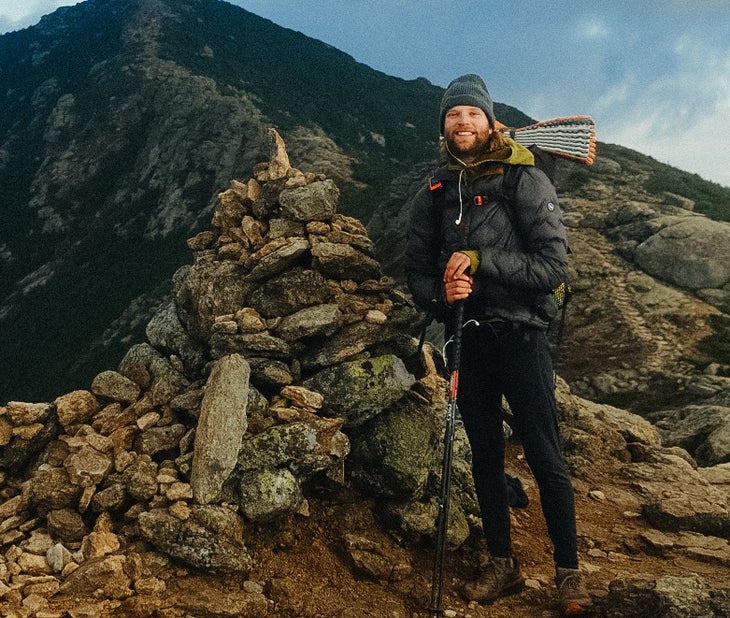



Billy “Wahoo” Meredith was hiking south from the Canadian border on October 13, 2023, having just tagged the northern terminus of the Pacific Crest Trail. Many hikers treat this 30-mile return trip as a victory lap, savoring their accomplishment and looking forward to real food, a real bed, and time to rest.
But Meredith had a flight to catch. That night, he took the redeye across the continent to Bangor, Maine. By the next night, he was at the top of Mt. Katahdin, the northern terminus of the Appalachian Trail. He descended the mountain in subfreezing fog, a fitting start to what would be a dark, cold trip on his final trail of the year.
Hiking any of the Big Three National Scenic Trails – the Appalachian Trail (AT), Continental Divide Trail (CDT), and Pacific Crest Trail (PCT) – is a lifelong dream for many hikers. Completing all three trails, known as the Triple Crown of long distance hiking, often takes years, and there are fewer than 700 known finishers.
The Calendar Year Triple Crown (CYTC) attempts to string together the full 7,514 miles of trail in one epic, uninterrupted adventure. Fewer than 20 hikers had ever completed the feat when Meredith stepped up to the southern terminus of the PCT in Campo, California on May 2, looking for a record.
“I went into this with the FKT as my main goal,” Meredith says. “I just kinda jump into things. If I’m gonna try to do it fast, I might as well go for the record and see.”
A native of Marietta, Georgia, Meredith’s first thru-hike came on his backyard trail, the AT, in 2019, a trip he completed with his best friend Andrew. Neither of them had spent more than three consecutive nights backpacking before.
“It was the hardest thing I’ve ever done in my life,” Meredith says. “A month in I was contemplating quitting, having all the thru hiker thoughts of, ‘Are we actually gonna make this?’ But it really helped having a friend out there.”
From then on, he was hooked. The Covid-19 pandemic hit a few months after he finished the AT, causing him to rethink his career aspirations and refocus on his love of being outside. He began thinking about the PCT. If he was going to do the PCT, he thought, why not do the Triple Crown? And if he was gonna do the Triple Crown, why not set the record?
Meredith had precisely zero FKTs under his belt when he began the longest FKT route in the world. Cam “Squamie” Honan set the unofficial CYTC record of 236 days in 2012, which Meredith used as a blueprint: A northbound PCT thru hike starting in May, then SOBO hikes of the CDT and AT. (Prior to Meredith’s hike, Jeff Garmire held the official self-supported record at 252 and a half days, set in 2016.) Unfortunately for Meredith, conditions would throw a wrench in his plans to hike all three trails with no flips.

Eyeing high snow in the Sierra, Meredith decided to flip from Tehachapi, 560 miles into the PCT, to the southern terminus of the CDT on May 21. For the next two weeks, he walked north through New Mexico until high snow in Colorado caused him to flip again, this time to the northern terminus of the CDT in Montana. On June 7, he began hiking south, an early start that would bring him more cold, unforgiving conditions.
“Within two days of starting I was the leading SOBO on the CDT,” Meredith says. “My first 25 days up there, I got poured on 23 of them.”
Fighting through the temptation to quit, Meredith made it through the rain, forded treacherous raging rivers, and climbed over constant blowdowns to complete the CDT on August 11. The next day, he flipped back to Tehachapi, where he had to brave 100 miles of Mojave Desert heat in the height of summer before reaching a more snow-free Sierra, his favorite section of the trail.
“That whole place just felt like a dream,” Meredith says. “It makes the hiking a lot easier when you’re somewhere like that and the miles just start peeling off.”
Conditions didn’t stay perfect for long, though. Hurricane Hilary dumped rain on Glen Pass, forcing Meredith to take a 7-mile day and ration his food. After making it through the Sierra and the rest of California, more rain awaited him up north.
“There was a five day stretch in Oregon where it rained nonstop and I didn’t see the sun,” Meredith says. “That was probably spot number two where I considered quitting.”
His final hurdle on the PCT came on his second to last day, when six inches of snow fell on the North Cascades. Meredith didn’t have much wiggle room, so after a little rearranging, he trucked through to catch that redeye out East and began following the white blazes south. With his goal in sight, Meredith’s nerves began to kick in.
“When you do that many miles every day for six months and you’re still the whole Appalachian Trail away from finishing your goal,” Meredith says, “I was just like, ‘Man it would be such a bummer to twist my ankle or get COVID or something out of my control that would end the whole thing.’”
Fall turned to winter, and Meredith found himself hiking in the dark for five or six hours each day, often in subfreezing temperatures.
“Waking up was always hard,” Meredith says. “Every morning it was just a decision of, ‘Am I gonna get my miles in today, yes or no?’”
As he headed back home to Georgia, the decision was yes, day after day. Meredith inched his way closer to his goal, cowboy camping on a foam mat and eating packaged food from the gas station convenience store. Sometimes he would go an entire day without taking his pack off once. As his goal line loomed, he began to visualize his lasts: Last time night-hiking in the rain, last time eating a Pop Tart for breakfast, then, finally, the last climb up Springer Mountain in Georgia.
On December 22, 234 days, 9 hours, and 55 minutes after setting out, Meredith completed his trek and secured the FKT, beating Honan’s record by two days.
“I had all these moments where I’d be tearing up on a mountain thinking the journey’s coming to an end, but in the actual moment of finishing, you’re just kind of pumped,” Meredith says. “It just felt like an out-of-body moment. When you’ve been doing that for so long, I don’t think your brain can really process that you’re done-done.”
The next morning, he hiked down the mountain to hugs from friends and family who had gathered to congratulate him. It was his first time seeing them in more than seven months: Since his trek was self-supported, Meredith couldn’t meet up with anyone he knew along the way.
But, Meredith points out, that doesn’t mean human connections weren’t there. In fact, although he hiked in isolation the vast majority of the time, he says spontaneous generosity was the key to securing his FKT.
“The biggest thing that kept me going was the kindness and selflessness of the people I met along the way,” Meredith says. “Anytime I got a hitch or met someone in town, when I did share my story with people, people would go out of their way to do the nicest things for me…It was a good reminder of the kindness of humanity.”
From 2024

